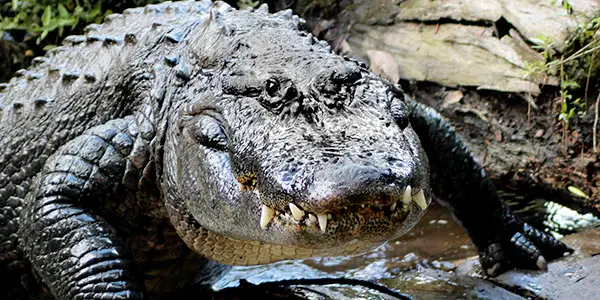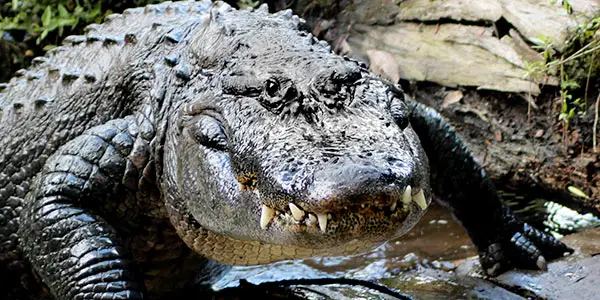Alligators are fascinating creatures that have existed for millions of years. They are often associated with danger and fear, but they actually play a vital role in their ecosystem. Have you ever wondered why alligators are so important? Let’s explore the many reasons why these creatures are essential to our environment and the world around us.
From their powerful jaws to their scaly skin, alligators are a symbol of strength and resilience. But their importance goes beyond their physical traits. Alligators are keystone species, meaning that they have a significant impact on their habitat and the other species that live within it. Join us as we dive deeper into the world of alligators and discover why they are a crucial part of our planet’s biodiversity.
Alligators play an important role in maintaining the ecological balance of wetland habitats. They help regulate populations of prey species, and their burrows provide shelter for other animals during droughts and extreme weather. Additionally, alligator eggs and hatchlings are a food source for many predators, and their large bodies can serve as a nutrient-rich food source for scavengers. Overall, alligators are a vital part of the ecosystem, and their conservation is crucial for the health of wetland habitats.

Why Are Alligators Important?
Alligators are often feared and misunderstood creatures, but they play a crucial role in the ecosystem. Here are ten reasons why alligators are important:
1. Alligators help regulate the food chain
Alligators are apex predators, which means they sit at the top of the food chain. This allows them to regulate the populations of other animals in their ecosystem. When alligators thrive, the animals they prey on are kept in check, preventing overpopulation and maintaining a healthy balance.
Alligators also help to keep the populations of other predators in check. They are known to prey on animals such as raccoons, opossums, and coyotes, which can become overpopulated and cause problems for humans.
2. Alligators help maintain wetland habitats
Alligators are often associated with swamps and wetlands, and for good reason. They are important indicators of the health of these ecosystems. Alligators dig out and maintain small ponds and wetlands, which provide habitat for many other species. These wetlands also serve as a natural filtration system, helping to clean water and prevent flooding.
3. Alligator hides are valuable
Alligators are hunted for their hides, which are used to make leather goods such as shoes, belts, and purses. While hunting alligators is heavily regulated, it provides a source of income for many people and helps to support local economies.
4. Alligators are a food source for humans
Alligator meat is considered a delicacy in many parts of the world. It is low in fat and high in protein, making it a healthy and sustainable food source.
5. Alligators are important to Indigenous cultures
Alligators have played an important role in the cultures of Indigenous peoples for thousands of years. They are often seen as symbols of strength and resilience, and their hides and teeth are used in traditional crafts and ceremonies.
6. Alligators are important to science
Alligators are a valuable research subject for scientists studying a variety of topics, from animal behavior to genetics. They are also used in medical research, as their immune systems are highly effective at fighting off infections.
7. Alligators are fascinating to observe
Alligators are fascinating creatures to observe in their natural habitats. They are strong, silent, and efficient predators, and watching them hunt and interact with their environment can be an unforgettable experience.
8. Alligators are survivors
Alligators have been around for millions of years, and they have survived mass extinctions and other catastrophic events. Their resilience is a testament to their importance in the ecosystem and their ability to adapt to changing conditions.
9. Alligators are a symbol of the American South
Alligators are often associated with the American South, where they are found in abundance. They are an important part of the culture and history of the region, and are often featured in art, literature, and music.
10. Alligators are a reminder of the importance of conservation
Alligators were once hunted to near extinction, but conservation efforts have helped to bring their populations back from the brink. They serve as a reminder of the importance of protecting our natural resources and preserving the biodiversity of our planet.
In conclusion, alligators are important creatures that play a vital role in the ecosystem. They help regulate the food chain, maintain wetland habitats, provide valuable resources, and are an important part of the culture and history of the American South. As we continue to face environmental challenges, it is important to remember the crucial role that these fascinating animals play in maintaining the health of our planet.
Frequently Asked Questions
Learn more about the importance of alligators in the ecosystem.
What is the role of alligators in the ecosystem?
Alligators play a crucial role in the ecosystem as top predators. They help regulate the populations of other species, such as fish and birds, which can have a significant impact on the food chain. Alligators also help maintain wetland habitats, as they create and maintain small pools of water during the dry season, which provides a breeding ground for many aquatic species.
Additionally, alligators’ nests provide shelter for other animals, such as turtles and snakes, and their carcasses serve as a food source for scavengers such as vultures and raccoons.
Can alligators survive in other habitats besides wetlands?
Alligators are semi-aquatic and can survive in a variety of habitats, including marshes, swamps, rivers, and lakes. They are adaptable and can even be found in urban areas, such as golf courses and neighborhoods with ponds and water features.
However, alligators do require access to water for survival, as they need to regulate their body temperature and hydration levels. Without water, they would not be able to survive for very long.
How do alligators benefit humans?
Alligators have economic and ecological value to humans. For example, their hides are used to make leather goods, such as shoes, belts, and purses. Additionally, alligator meat is considered a delicacy in some parts of the world.
Ecologically, alligators help maintain the balance of the ecosystem, which benefits humans in many ways. Wetlands, for example, act as natural filters for water, which helps improve water quality and reduce flooding. Wetlands also provide recreational opportunities, such as fishing, hunting, and bird watching.
What threats do alligators face?
Alligators face several threats, including habitat loss, poaching, and pollution. As wetlands are drained and developed for human use, alligators lose their natural habitat, which can lead to a decline in population. In some areas, alligators are hunted for their hides and meat, which can further reduce their numbers.
Pollution is also a significant threat to alligators, as they are at the top of the food chain and can accumulate toxins in their bodies. This can lead to health problems and even death.
What can be done to protect alligators?
Conservation efforts are crucial to protect alligators and their habitats. This includes protecting wetlands from development and pollution, enforcing laws against poaching and illegal hunting, and educating the public about the importance of alligators in the ecosystem.
Additionally, researchers continue to study alligators to better understand their behavior and needs, which can inform conservation efforts. By working together, we can help ensure that alligators continue to play a vital role in the ecosystem for generations to come.
The Secret of Regeneration in… Alligators
In conclusion, alligators are an essential part of our ecosystem. These reptiles play a crucial role in maintaining the balance of our wetlands and waterways. By keeping populations of prey animals in check, alligators help prevent overgrazing and protect plant life.
Furthermore, alligators are important sources of tourism and recreation. They draw thousands of visitors to parks and wildlife sanctuaries every year, generating revenue for local businesses and supporting conservation efforts.
Most importantly, alligators deserve our respect and protection. These ancient creatures have survived for millions of years, but they now face threats from habitat loss, poaching, and pollution. By recognizing the vital role that alligators play in our environment, we can work to conserve and protect these magnificent creatures for generations to come.


